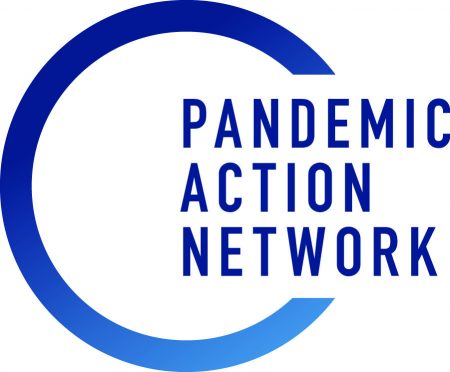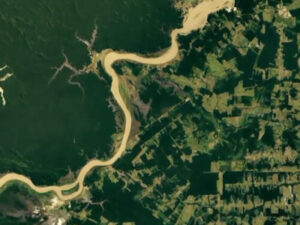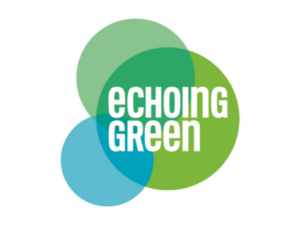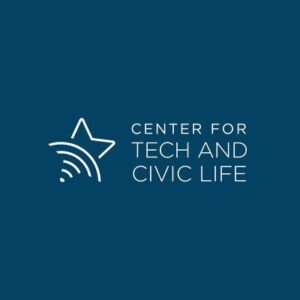The Pandemic Action Network is a partnership of over 350 diverse organizations founded in April 2020 by leaders in global health advocacy, crisis response, and communications. The organization drives collective action through advocacy, communications and campaigns to ensure that governments are better prepared to deal with outbreaks and pandemics and that countries around the world have equitable access to the tools and information they need to protect their citizens.
Eloise Todd of Pandemic Action Network spoke with Ambika Samarthya-Howard on December 7, 2023. Click here to read the full conversation with insights highlighted.
Ambika Samarthya-Howard: Can you introduce yourself and also describe the problem that you’re addressing and how you’re responding to it?
Eloise Todd: I’m Eloise Todd, the executive director and co-founder of Pandemic Action Network, and we kicked off in April 2020 with our launch right at the outset of COVID. Like-minded co-founders found each other. I came to the scene in March 2020, seized by the fact that lots of governments are making very big decisions, very different decisions from each other, and there seem to be very little or no civil society voice, and there seemed to be a need to bring expertise and advocates and campaigners together in a virtual way at that very difficult time. A lot of us were concerned that these big decisions being taken when COVID-19 came to Europe, for example, would end up impacting some of the poorer countries in the world, and that we’d end up exporting the problem and inflicting it elsewhere.
I found, a bit through a circuitous route, that David Nabarro was made COVID Special Envoy for the World Health Organization (WHO). I’d worked with him before on Ebola, and in fact, all of the co-founders of Pandemic Action Network had some link to the Ebola crisis in 2014. We’d worked on it in different ways. I worked with it as global policy director at the One Campaign doing an accountability exercise, and got to work with David Nabarro through that. And I said, “How can I support you? How can we, on a voluntary basis, brief advocates to get civil society going on some of this?”
He encouraged me to talk to Gab Fitzgerald, who he said was having similar conversations to the ones I was having with him. We connected and I said, “We need some COVID advocacy network to bring people together.” And she said, “Well, there’s some of us that want to work on pandemic preparedness in the longer term.” So we had this conversation and said, “Well, let’s do both.” COVID advocacy now for equitable access to tools that weren’t yet invented, but also laying the groundwork for a longer term push on making sure every country is better prepared to prevent future pandemics.
That was the story. Cue mid-March, five-hour Zoom calls every day for the next month as lockdowns and homeschooling were starting, and we decided we needed some partners to launch with. We had some seed funding. We decided what our modus operandi would be, and we launched on the 22nd of April 2020. On day one, it was me, and we were around about the time that donors and other international organizations were putting together the Access to COVID Tools Accelerator. How can we bring money together? How can we bring tools together for the most vulnerable?
We engaged in that, behind the scenes, trying to influence what that would look like, and more publicly, trying to raise money for it. That was a key part of our 2020 work, plus building a team, getting people on board. We decided early on that we wanted to have a broad geographic spread. We’re like, “this is global.” So anytime we could hire someone, we wanted to hire someone in a different place. It was the time of remote working, so we were like, why not? This is great. We can have a multicultural approach to this and get different perspectives, and also hopefully build up working groups in different parts of the world. That was a key theme when we started.
Secondly, we believe that pandemics, while they certainly start with a pathogen, they’re not just a health problem. They affect every single aspect of society. We really wanted this to be a cross sectoral approach. We are a civil society organization, very much mission driven, but we believe that we can’t get to solutions without having everybody in the room, whether that’s private sector, international organizations, media partners, foundations, delivery groups, or community groups. All of those people are necessary. In terms of partnerships, we had an open door to different kinds of partners joining the Pandemic Action Network. The global reach plus cross sector and cross-functional approach was a really important one for us from day one.
Ambika Samarthya-Howard: Can you describe the work that the organization does? Are you direct service, or are you more policy centered?
Eloise Todd: We are a network now of over 350 organizations that advocate mainly to governments to make sure governments are better prepared to stop future outbreaks from becoming pandemics. That means that we drive collective action through advocacy, communications and campaigns. We do a lot of policy work and policy ideation, and we call it networked advocacy. Our headcount for a global organization is very small, but the leverage we can get, because we have 350-plus partners, is a lot larger. We crowdsource our policy. We will kickstart, be the firestarters, for policy documents, but then we will put them out to the whole network and say, “Give us your expertise, make this better, give us your opinions.”
We do this radical collaboration, I would say, which is something that we’ve honed over the last nearly four years now, and it’s a really important part of how we operate. We have a point of view, a mission-driven approach, and we have our positions, but we want to bring as many people with us as possible.
We are a network, not a coalition. That’s also by design. We don’t want to wait until we have a consensus. We’re always moving and we say, “Please join us. Please help shape it along the way. You might steer the ship a little bit, but the ultimate destination is going to be clear.” So we have this approach where we want to keep moving, but we want to bring as many people with us as possible.
Ambika Samarthya-Howard: Can you give me an example of something that you’ve worked on to visualize what it looks like?
Eloise Todd: When we started in 2020, one of our major advocacy targets was raising money for this Access to COVID Tools Accelerator that I talked about. We also spotted quite early the problem that would come with vaccine access in terms of lack of access to contracts. We raised money for the Access to COVID Tools Accelerator to buy vaccines for lower middle income countries.
And we said, “well, hang on a minute. If the rich countries have already got their contracts in place, even if you can buy vaccines, when are you going to get them off the production line?” You’re going to have to wait two years. This is unacceptable. You’re going to have to go to dose donations, which is something no one wants to do because it’s like the charity model. But you had rich countries buying eight, ten times what they needed, and then lower middle income countries far down the line.
Already in late 2020, we were developing policy positions on what a good dose donation looks like. This is not something we desire to do, but a reality of where we are. How can we do that as well as possible? And that was an important kickstarter to get some of the groups on the inside that didn’t want to believe that they had to be reduced to donations, to face up to that and to develop their own policies about how to do it and how not to do it.
Equitable access to tools has been a key theme throughout. We also pushed for a UN summit or a global summit of some variety, some leadership to say, world leaders need to come together and discuss these points. So we pushed at various levels, and eventually the US government, Joe Biden, did a global COVID summit in September 2021, and then a follow-up summit in May 2022. We worked very closely with them behind the scenes to develop the agenda for action, with partners as well, not just us. We were a strong part in making sure that happened.
Another thing we’ve really pushed for is the development of the Pandemic Fund, which was launched last year in 2022. That was a big priority for us to make sure we have somewhere where there’s dedicated funding to fill the gaps in pandemic spending for lower middle income countries. We also put a lot of effort into making sure there’s civil society representation on that, and we organized a consultation at whip smart speed before the Pandemic Fund launched. There was some jeopardy in the months leading up to it, whether there would be adequate civil society representation. We therefore tried to make the case to many on the board that were supportive, but some others, to show how important it would be to have that.
And since then, we’ve also been trying to raise funds for the Pandemic Fund. This year, 2023, we’ve worked a lot on the high-level meeting that happened in New York. And then looking to next year, we’re engaged in the pandemic instrument process to make sure that that goes beyond business as usual, and we actually have a mechanism that allows countries to cooperate sensibly in times of crisis.
The priorities we are pursuing within that are about equitable access to pandemic countermeasures, whether that’s test treatments, vaccines, stockpiles of PPE, the full gamut. Secondly, we want to make sure there’s adequate accountability in monitoring. So we’d like to see a COP-like [Conference of the Parties] process, we say, for pandemics. Annual accountability that really puts leaders on the hook and gets this beyond the health sphere and gets finance ministers and political leaders understanding that it’s going to take their political leadership and direction to make sure we have these largely avoidable situations.
We can prevent some zoonotic spillover, which is the largest cause of pandemics, if we preserve nature, and this is the link with climate change as well, and why it’s important to work with people across different sectors. Some outbreaks will be inevitable, but outbreaks don’t have to become epidemics or pandemics. And so that’s the piece that we’re focused on.
Ambika Samarthya-Howard: How do you measure success?
Eloise Todd: Very good question. Measuring success is about the political outcomes, which is hard because we’ll judge ourselves on “did we do everything possible to try and get the results.” The Pandemic Fund was set up. We see that as a win. We have equitable access. It doesn’t mean it’s settled yet, but the line is being held. We are inserting gender, pushing for gender aspects to be integrated into the pandemic instrument, for example. That’s another area we’ll hold ourselves accountable to. So political and financial outcomes are how we measure success.
And there’s a top line issue for us, which is keeping pandemic prevention, preparedness and response on the political agenda, which was already actually getting difficult in 2021, even though we were still going through COVID. And then in 2022, when Russia invaded Ukraine, all bets were off in terms of where the political attention is, and now we have more conflict, more attention to conflict, terrible things going on in the world, and it’s increasingly difficult to get that focus. And it’s even more urgent because we have to make sure we don’t lose the opportunity to action the lessons that we’ve had from COVID while it’s still relatively fresh in our minds.
Ambika Samarthya-Howard: Those are all great achievements. I would love to hear something that didn’t work, or a lesson you learned?
Eloise Todd: In terms of the way in which we operate, what’s hard? Well, we are a 17-person organization, many of whom are part-time. The organization is spread out over nine countries and four continents. I met one of my co-founders two years ago, for the first time. We met as a team for the first time ever in February 2023. I was privileged to have already met most people, but in that meeting of 17 people, five people were new to me in terms of real life.
What does that mean? We are spread in time zones from Seattle to Singapore, from London to Nairobi, and that’s quite hard to sustain. We all got used to working like that through COVID. We love it. We love the global aspect to our team. We love the fact that we have this equity, if you like, on the calls. It’s a great leveler. That kind of thing can happen if you are in a big team in London or New York or whatever it is, and you’re like, “oh, let’s ask someone from this country to get that perspective.” All of that goes, but you don’t have the human interaction, the way of working, the little chats over the water cooler.
So none of what I’m saying is news to anyone because everybody lived through it through COVID. But for us, that situation continues. We’re small dots on the map and we connect in that way.
Ambika Samarthya-Howard: How do you feel like that affects you differently than say, other remote or distributed organizations?
Eloise Todd: I think what’s been interesting over the last couple of years has been the emergence of the opening up time. As the world opens up, as there’s the World Health Assembly, there was a time it was like, “oh, do we go? Do we not go? Is it controversial because of COVID? Can we afford it?” We didn’t have a travel budget. Of course we didn’t. We started during COVID. We have no overheads. We all work from our houses. We have the staff cost, but that’s it. And so, that transition to going to places in real life was quite a big deal.
The first event we put on as Pandemic Action Network, it makes me laugh now, was in September 2022, and it was the first time many of the team were meeting in person ever. Our speakers were former Prime Minister Helen Clark interviewing the current prime minister at the time, Jacinda Ardern of New Zealand, Ellen Johnson Sirleaf, elder and general legend. Ayoade Alakija. David Miliband, head of the IRC. Raj Punjabi, who at that point was in the US government at the Harvard Club in New York.
Some of us had put on several events in our old jobs, we politely call ourselves seasoned advocates. But everybody was a bit rusty. We’d all been through COVID. No one had been event organizing for a long time. We did a bang up job, I’m going to say. It was amazing. But afterwards I was like, blimey, that’s quite a hard thing, putting all of that together.
I think what we’re getting to and what we’ve come to is, those meeting points around the world, whether it’s UNGA or World Health Assembly, we try to put connection points in there. We’ll do a social. We’ll do a working session. I was just at COP where we did an in real life meeting of our Middle Eastern and North Africa working group in the region, and lots of people were there.
At the SIFIA conference the week before in Lusaka, the launch of our new advocacy network, Resilience Action Network North Africa, which is like the next generation. It’s an initiative that’s come out of a new partnership that’s coming out of our work and was a chance for 80-plus people [to come together], many of whom are partners of ours.
Those moments take on a huge significance. It’s not just putting on an event. It’s not just filling the time. It’s like, “what can we do and how can we leverage that and really move things forward in a way that makes sense? Who do we need to be there?” I think we’re very conscious of those “in real life” opportunities.
Ambika Samarthya-Howard: I’m curious, what were the main challenges? Was it not being able to have water cooler conversations? Did you miss deadlines? Did you feel like you just weren’t able to produce as much? Did you have more work conflict?
Eloise Todd: I think the main challenge that we face is not burning out, because we actually produce an awful lot for a tiny team, and understanding where people are on a human level. You don’t have the, and thank goodness, the CCTV camera knowing who’s doing what. You can’t eyeball people in the corner of the room and be like, “they’re doing too much, they’re too late etc.”
We’ve done quite a lot of work in the last year and a half on healthiness of the organization, values, work-life balance, cross-cultural things. Those things are quite hard. Moving from the first phase of a crazy startup when it’s like, “Hey, it’s me and it’s you, and you’ve got this time and I’ve got this time, and let’s do this,” and anything you do, anything you achieve is great, to that mid-phase where we’re not a huge organization, but we have got a reputation for certain things now and there’s certain expectations of us. There’s a way in which we’re working, and trying to level set, and trying to say, “how do we work as an organization? What’s our personality?”
We have some values that we came up with in the first year that were a reaction to the fact that many of us were coming from different cultures and we thought we should have some grounding here. But we’re evolving that over time and making sure we’re keeping up with where we are as an organization nearly four years in, without losing the nimbleness and all of the things that are positive about being relatively light as an organization.
Ambika Samarthya-Howard: Can you talk more about what you mentioned earlier, about the government challenges or the political challenges. I’d love to hear more about that.
Eloise Todd: The biggest challenge for Pandemic Action Network, but also the reason we exist and must continue is, governments are not interested in engaging. Leaders are not interested in engaging in the pandemic prevention and preparedness agenda in a serious way. When you think of what everybody went through, what we lost in terms of lives, livelihoods, economics, time, interaction with humans, is quite shocking.
We also think that that’s a psychological response in many ways for the politicians. It’s also a political response. There are not that many leaders that covered themselves in glory in terms of lives lost in their own country and the way that they approach things. There isn’t a huge appetite politically or psychologically to go over what happened and learn from it. So everyone’s a bit, “Well, let’s move on.” The political life cycle in a democracy, three, four, five years, many leaders will take the bet that there probably won’t be another one on my shift.
We’re trying to make the case for prevention, which is celebrating things that didn’t happen. That’s quite hard. I think that the world has got the memo on climate change. That’s not to say that enough is being done. We’re seeing it now at COP, there’s equivocation, there’s difficulty, there’s all sorts of trying to get around the facts, but world leaders showed up there last weekend and they understand that if I do something on climate, it’s of limited use if my fellow leaders don’t do that.
That penny hasn’t dropped yet, the pandemics, the pandemic prevention, or the sense of urgency hasn’t quite popped. And that’s what we’re here to do. To make sure that the process, known now as the pandemic instrument process, is a success. We need the investments particularly in lower middle income countries that are not well-equipped to detect and respond. And the impact there would be absolutely devastating in terms of turning back the clock on progress, on the poverty agenda, on the health agenda, and on the economic agenda.
The scale of our mission is to get this high up the political agenda on the G20, on the G7, work with the Africa CDC, Center for Disease Control, make sure that African governments are also doing this, as well as Asian governments. These are the places that we work most closely, as well as in the Middle East, where we can also connect the dots between some of these areas and learn from best practice and create this sense of momentum with others that are doing this work who are not many.
And so the importance of Skoll as a funder for us cannot be overstated. Skoll has decided to stick with this challenge for the foreseeable future, and at a time when some other donors have dropped the issue and said, “actually, it’s now all about climate”, to which we would say climate change makes future pandemics even more likely, and could erase so much progress. And these are relatively small investments. They make so much sense. And in many ways there’s a shared agenda between protection of nature and pandemic prevention. There’s a shared agenda between developing climate-resilient, pandemic-resilient health systems that are also built as carbon-neutral systems that could take 5% of emissions out of the air if we did end-to-end decarbonization of the health sector. And if we do that in a way that also invests in countries that didn’t have the access to the R&D, to the manufacturing.
We would also say the political angle of this, the big politics if you like, is huge. Europe and the West in general, if we call it that, can sometimes be surprised when certain positions are not taken in international fora by, for example, lower middle income countries. And the connection between the absolute shocking inequity that happened during COVID, the absolute bruising, every country for itself approach has had a huge impact on international relations. This is not just a “doing the right thing” issue, this is about diplomacy as well.
We’re in the business of trying to connect the dots, trying to show governments that you need to do the right thing. We need to prevent pandemics, we need to invest in these pieces. It’s politically smart for you to do so, and to think of this way beyond the health ministry, because this is in your financial interest, it’s in your diplomatic interest, it’s in your interest as a leader to make sure that if this happens on your watch, you’ve done the due diligence, and not just at the national level, but actually internationally, because the ramifications of not having multilateral or regional responses to future pandemics could be hugely damaging in ways that we can’t imagine.
Ambika Samarthya-Howard: It sounds like you identify as a systems change organizer, or a systems change organization. Would you agree with that? What do you need from other actors in the field to push that work forward?
Eloise Todd: What we need from the different actors depends on where they sit in the world. In high income countries, we’re looking for them to look beyond their borders, think of this problem multilaterally, both in terms of how they’re investing their resources, but also how they’re designing their policies. And then in lower middle income countries, we want to support efforts to increase the robustness of healthcare systems and surveillance. We want to get policies on the books that will make it easier for counter measures to flow between borders in a crisis, and to help them raise their voices in international processes, so that the powerful countries can’t afford to ignore that.
Some of this is about national level work and working with partners. Obviously we’re the size that we are, in nine countries across four continents, but there are many partners on the ground that know their systems really well. The way we operate is to try to make it easy for all sorts of organizations to advocate on pandemic prevention, preparedness and response. We want to provide policy messaging, advocacy tools and advocacy letters. We do pieces of work, but we refine with lots of people, and then we get lots of people to sign on, and then we make sure we push it out.
We’re like an advocacy service provider on the issue that we’re most expert in, and we’re increasingly trying to connect the dots with other agendas. For example, the Multilateral Development Bank agenda, IFI reform, making sure that when we’re talking about unleashing new funding streams, for example, special drawing rights of the IMF, tripling lending, or thinking about the climate adaptation funds, making sure they’re invested in a way that also helps build these resilient health systems that are not only climate resilient, but also have the pandemic resilience in mind. So there’s different angles to our work.
Ambika Samarthya-Howard: I think that touches on the next thing I was going to ask you, which is where do you see yourselves five years from now?
Eloise Todd: Yes, absolutely. And in fact, our new partnership with Resilience Action Network Africa, which is something we’ve collectively developed as a team, is something we launched on the 29th of November. That’s precisely the concept that we’ve launched for Resilience Action Network Africa, which is Africa-registered, Africa-led, with an African board, so it will be separate, but joined, in partnership, not legally. Why have we done that? Because we want to do things differently. Not only do we want to be networked advocacy advocates, we want to genuinely work in partnership with southern-led organizations and not assume or have any power dynamics get in the way of what we should be asking for.We will work in equal partnership as a global entity with an African entity.
If the model plays out in the way that we hope it does, which is a forum for advocacy on resilience more broadly, where we are bringing to the table expertise on health, pandemic prevention, preparedness and response, and some expertise on how those issues interact with climate and interact with finance and interact with gender. We want to invite in networks that are experts in gender, finance, nature, climate, financial inclusion, in all these other issues and say, “we need to build a much stronger advocacy space for civil society.”
Civil society space is shrinking all over the world. It’s shrinking politically. There’s also less and less money. That means, sometimes it can mean that people get less brave. Civil society space is shrinking politically and in terms of finance available. What we envision is an advocacy model whereby it’s not competitive. There’s too much energy wasted with people saying, “how can I outdo this org, because we need to compete for funding.” We’re saying, “how can we be stronger together? How can we look at what you are doing and say, that’s brilliant. We’re not going to do that because you are doing it. In fact, we’re going to raise it up, and we’re going to shine a light on it, and we’re going to get behind you, and then all of us are going to be part of this.” We really think that this approach is the only way to tackle the next five years.
So to answer your question more succinctly, “where do I see us in five years?” I hope that we have a thriving Pandemic Action Network that is giving advice to organizations across the world to make sure they’re better prepared to advocate on these policies. [We hope to see] that we’ve had impact in terms of policy change, and that we have a thriving Resilience Action Network Africa that is taking this whole range of issues and helping advocates absolutely knock it out the park with brilliant advocacy logistical machinery in place that connects capitals north and south, G20, African Union and beyond. And if we’ve done really well, this will be a model we’d like to replicate in other parts of the world, so that we have a networked leadership approach to the advocacy model.
Ambika Samarthya-Howard: What advice or insights would you give to people wanting to do this work?
Eloise Todd: Politically, be extremely clear about what you want to change. Be single-minded and focused. On a human level, give people grace across borders. It’s really hard to do this remotely, and you need to give people the benefit of the doubt, but also trust your instincts. Logistically, understand that one of the most important things about advocacy is getting materials to decision makers. This might seem basic, but you’d be amazed at how many times a lot of energy can be put into relatively internal conversations or things within the movement, etc. Building the machinery to get opinions, well-evidenced policy backed by lots of partners to the people making the decisions. Spend time on your logistical machinery.
Ambika Samarthya-Howard: What is logistical machinery?
Eloise Todd: It depends what you’re doing and what you want to change. It’s about identifying the right targets, making sure you’re giving them smart analysis that is relevant to them and not just spamming them with generalities. Making sure you are disciplined, you have the discipline needed to draft something, take into account lots of different opinions, tie it up in a bow, get sign-ons, then get it out. That’s a lot of work and a lot of stages and a lot of graft. But it is those kinds of pieces that can, if you get enough support behind positions, really make a difference.
And use the power if you’re interested in this networked advocacy. Which does exist. But, I’ve worked for big advocacy organizations. I’ve done too many start-ups for someone of my age and fatigue. You’ve got to be really dedicated and focused on the mission to be able to see it through.
Ambika Samarthya-Howard: Thank you for your time today.
Click here to read the full conversation with insights highlighted.
Ambika Samarthya-Howard (she/her) is the Solution Journalism Network’s Chief Innovation Officer: She leads on innovation and technology, leverages communication platforms for the network strategy and creates cool content. She has an MFA from Columbia’s Film School and has been creating, teaching and writing at the intersection of storytelling and social good for two decades. She has produced content for Current TV, UNICEF, Havas, Praekelt.org, UNICEF, UNFPA, Save the Children, FCDO, Global Integrity and Prism.
* This interview has been edited and condensed.
Find other networks driving collective action in social innovation.







